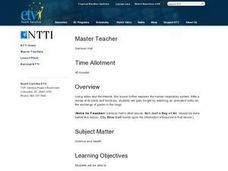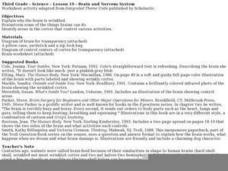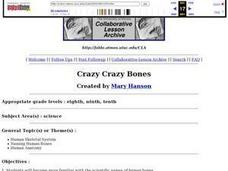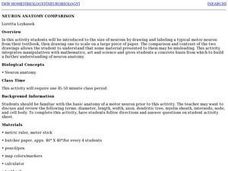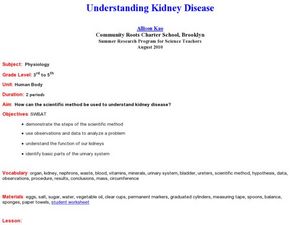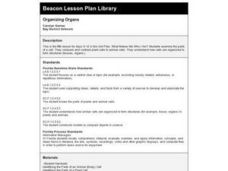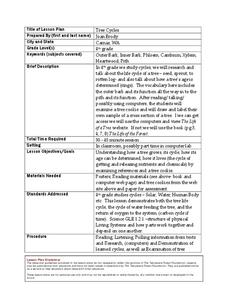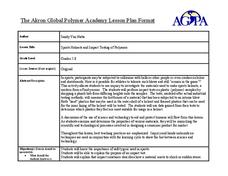Curated OER
CO2 Blow Out!
Fifth graders determine that carbon dioxide is a gas given off during respiration and that oxygent is the gas that is absorbed during respiration. They determine the air capacity of the lungs.
Curated OER
The Journey of a Red Blood Cell
Fifth graders examine how a red blood cell travels throughout the body. Using a model, they recreate the flow of blood through the heart. They also label the lungs and the differece between the blood that enters the heart and the blood...
Curated OER
Brain and Nervous System
Third graders study the physical characteristics of the brain and identify its parts through this series of lessons.
Curated OER
Animal Adaptations
students in groups to work on bulletin board, making a list of animal adaptations. They write an example of each body covering and find pictures of animals with these coverings. They mount pictures and label the covering. They should be...
Curated OER
Shells
Sixth graders label diagrams of the 6 different classes of mollusks and explain the meaning of the labeled terms. They identify 8 common New Haven shells. They organize their own shell collection during this series of lessons.
Curated OER
Explore! Fun with Science
Students explore the challenges of living in space by designing a facility that can provide everything required to support humans and can protect them from the harsh environment of space.
Curated OER
The Journey of a Red Blood Cell
Fifth graders examine how a red blood cell travels throughout the body. Using a model, they follow the flow of blood throughout the entire body. They identify the functions of the lungs and discuss the difference of the blood entering...
Curated OER
Crazy Crazy Bones
Students practice labeling the bones of a human skeleton. Students reword the song "Dry Bones" with the accurate names of the bones listed.
Curated OER
Insects
Young scholars work in groups to investigate the concept of insects. They participate in a variety of activities that include the gathering of samples and making observations like identifying different body parts. The lesson integrates...
Curated OER
Neuron Anatomy Comparison
Pupils create a scale model of a motor neuron that is two hundred times larger than the actual neuron. They identify the structures of a neuron and observe neurons under the microscope then use a worksheet to convert actual sizes into...
Curated OER
Understanding Kidney Disease
Students experiment to determine information about kidney function. In this kidney function lesson, students use the scientific method to experiment with eggs, water, salt, sugar, and vegetable oil to simulate kidney function. They...
Curated OER
The Amazing Ant
Students explain that ants are an important element of nature's balance. Ants eat many insects and are food to other animals. They watch a video and conduct hands-on activities that give them an excellent overview of the ants role in...
University of Minnesota
Sheep Brain Dissection
Bored with frog and earthworm dissections? Had your fill of fetal pigs? Anatomy young scholars will be intrigued by the sheep's brain, and you will be prepared with guiding questions, extension activities, and pictures as they dissect...
Curated OER
Organizing Organs
Fifth graders research plant and animals cells and create a Venn Diagram to show the similarities and differences.
Curated OER
Magnetic Discovery Bottle
Students examine how to conduct simple investigations and use simple equipment to gather data. For this magnet lesson students decide what types of objects are attracted to magnets.
Curated OER
Tree Cycles
Fourth graders investigate the life cycle of a tree by researching the Internet. In this plant life lesson plan, 4th graders observe The Life of a Tree website and discuss the life of a tree from sprout to death. Students create a...
Curated OER
Extensions - Biology Review Unit
Learners engage in a variety of activities in order to review a Biology unit. For example, they research the Bird Flu, it's history, how it is spread, what has been done about it, what better options exist for controlling or removing it....
Curated OER
Cellular Cellebrities
Sixth graders, in groups, learn the morphology and function of organelles within plant and animal cells.
Curated OER
Sports Helmets and Impact Testing of Polymers
Students examine the importance of good quality safety gear. In this investigative lesson, students will tests various polymers, collect data, and analyze the data to determine which polymer is best for safety helmets. They will design a...
Curated OER
Hazard Mitigation: Bioterrorism
Learners discuss different ways to spread infectious diseases. In this bioterrorism lesson, students model the rate of smoke emission using CalRoad software. They analyze the effects of airborne release of biological...
Curated OER
Water Is Cool!
Students explore the importance of water. In this water lesson, students view a table to determine the amount of water found in the oceans, lakes, atmosphere, and streams. Students discuss ways to be a good steward of water.
Curated OER
Water Is Cool!
Students study water as a non-renewable resource. In this water lesson, students examine sources of water, uses of water, and explain why it is important to take care of water sources for the common good. They research the water cycle...


